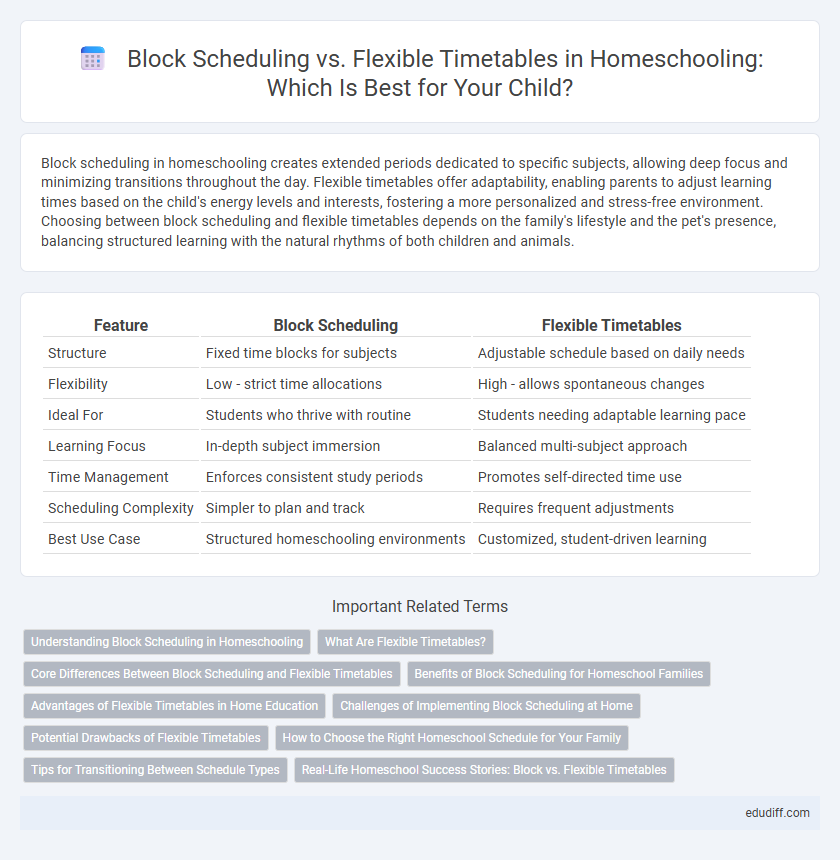Block scheduling in homeschooling creates extended periods dedicated to specific subjects, allowing deep focus and minimizing transitions throughout the day. Flexible timetables offer adaptability, enabling parents to adjust learning times based on the child's energy levels and interests, fostering a more personalized and stress-free environment. Choosing between block scheduling and flexible timetables depends on the family's lifestyle and the pet's presence, balancing structured learning with the natural rhythms of both children and animals.
Table of Comparison
| Feature | Block Scheduling | Flexible Timetables |
|---|---|---|
| Structure | Fixed time blocks for subjects | Adjustable schedule based on daily needs |
| Flexibility | Low - strict time allocations | High - allows spontaneous changes |
| Ideal For | Students who thrive with routine | Students needing adaptable learning pace |
| Learning Focus | In-depth subject immersion | Balanced multi-subject approach |
| Time Management | Enforces consistent study periods | Promotes self-directed time use |
| Scheduling Complexity | Simpler to plan and track | Requires frequent adjustments |
| Best Use Case | Structured homeschooling environments | Customized, student-driven learning |
Understanding Block Scheduling in Homeschooling
Block scheduling in homeschooling involves dedicating extended periods, typically 60 to 90 minutes, to focused subjects, enhancing deep learning and retention. This approach allows flexibility in curriculum pacing, accommodating individual student needs and reducing daily transitions between subjects. Understanding block scheduling benefits homeschoolers by fostering concentrated study time, improving comprehension, and creating a customizable, distraction-minimized learning environment.
What Are Flexible Timetables?
Flexible timetables in homeschooling allow students to adapt their daily schedules based on individual learning paces and priorities, promoting personalized education. Unlike rigid block scheduling, this approach supports varied subject durations and breaks, enhancing engagement and reducing burnout. By accommodating changing family routines and student needs, flexible timetables foster a balanced and responsive learning environment.
Core Differences Between Block Scheduling and Flexible Timetables
Block scheduling organizes homeschooling into extended periods focusing on fewer subjects per day, fostering deep immersion and reduced transitions, while flexible timetables allow for adaptable learning times tailored to daily needs and student energy levels. Block schedules emphasize structure and consistency, supporting mastery through longer, uninterrupted sessions, whereas flexible timetables prioritize responsiveness and variety, accommodating unexpected changes and individual pacing. The core difference lies in rigidity versus adaptability, with block scheduling delivering systematic routine and flexible timetables offering personalized time management for varied homeschooling dynamics.
Benefits of Block Scheduling for Homeschool Families
Block scheduling in homeschool settings enhances deep focus by allocating longer periods for subject immersion, promoting better retention and mastery of complex topics. Homeschool families benefit from increased flexibility within focused time blocks, allowing for fewer daily transitions and reduced stress for both students and parents. This approach supports individualized pacing and accommodates varied learning styles, optimizing educational outcomes in a personalized environment.
Advantages of Flexible Timetables in Home Education
Flexible timetables in home education allow personalized learning paces tailored to the student's unique needs, enhancing engagement and retention. This approach supports spontaneous learning opportunities and adapts to family schedules, promoting a balanced lifestyle. Research shows that flexible scheduling increases motivation and academic achievement by accommodating various learning styles and reducing stress.
Challenges of Implementing Block Scheduling at Home
Implementing block scheduling in a homeschool environment often poses challenges such as maintaining student engagement during extended learning periods and balancing diverse subject requirements within limited daily hours. Parents may struggle with time management due to unpredictable interruptions or multi-age teaching demands, making it difficult to adhere strictly to long blocks. Adjusting to the rigidity of block scheduling can reduce the flexibility needed to accommodate varying learning paces and individualized educational needs in the home setting.
Potential Drawbacks of Flexible Timetables
Flexible timetables in homeschooling can lead to inconsistent learning rhythms, which may affect retention and knowledge mastery. Without a structured schedule, students might experience procrastination and decreased motivation, resulting in incomplete coursework. The lack of clear daily goals can create challenges in tracking progress and maintaining academic discipline.
How to Choose the Right Homeschool Schedule for Your Family
Choosing the right homeschool schedule depends on your family's lifestyle, learning preferences, and subjects' complexity. Block scheduling offers focused, in-depth study periods ideal for families with older students or those needing structured routines. Flexible timetables provide adaptability, allowing for varied learning paces and easier accommodation of extracurricular activities and family commitments.
Tips for Transitioning Between Schedule Types
When transitioning from block scheduling to flexible timetables in homeschooling, gradually introduce shorter, varied learning sessions to help students adapt to increased subject changes. Emphasize consistent review periods and maintain a structured core routine to provide stability during the adjustment phase. Tracking productivity and adjusting the schedule based on individual learning rhythms enhances the effectiveness of the new timetable.
Real-Life Homeschool Success Stories: Block vs. Flexible Timetables
Real-life homeschool success stories reveal that block scheduling enhances focus by dedicating extended time slots to single subjects, fostering deeper understanding and reduced daily transitions. Flexible timetables provide adaptability, allowing families to tailor learning around changing routines and individual student energy levels, which many report as boosting engagement and reducing stress. Both approaches demonstrate that aligning the schedule with a child's unique learning style and family dynamics is key to effective homeschooling outcomes.
Block Scheduling vs Flexible Timetables Infographic

 edudiff.com
edudiff.com